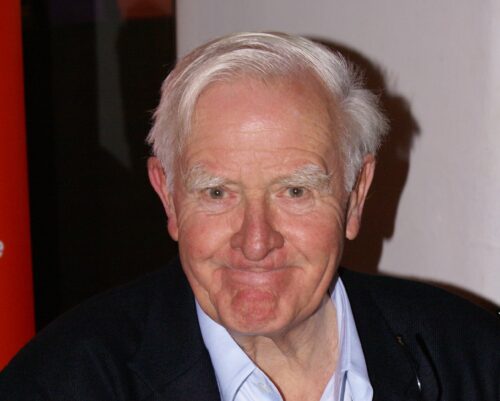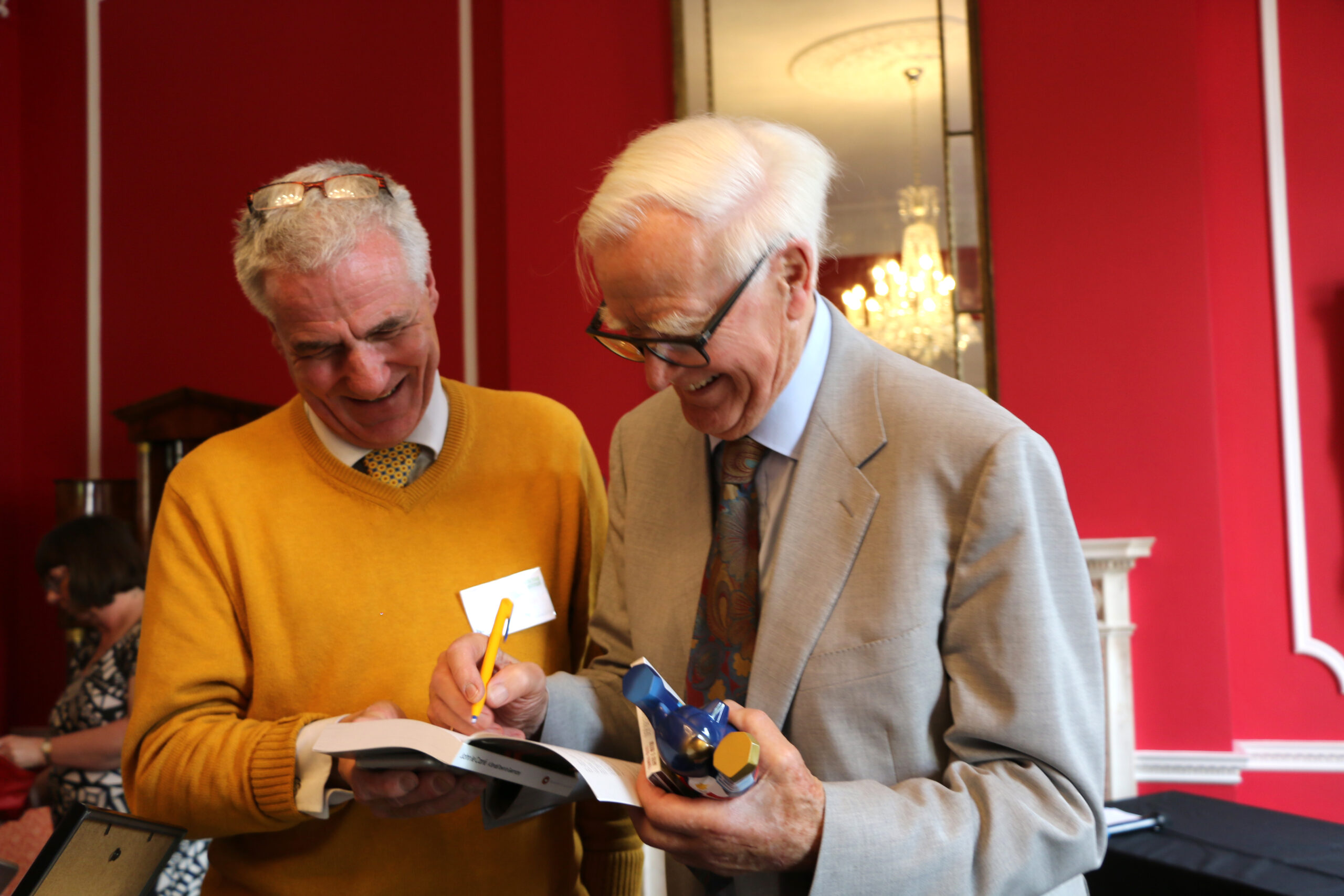John le Carré signing books after ceremony at the German Embassy in London on 12 June 2017. Photo: German Embassy London / CC BY 2.0 DEED.
David John Moore Cornwell, better known by his pen name “John le Carré”, was an English author who wrote numerous highly acclaimed espionage novels, virtually all of them best sellers and some of which were adapted for film or television, He was also a spy himself.
He was born on 19 October 1931 in Poole, Dorset, England, to a father who was a con man and a mother who abandoned him when he was five years old. He had an older brother, a younger half-sister, and a younger half-brother. He studied foreign languages at the University of Bern in Switzerland, and then at Lincoln College, Oxford, where he earned a BA. He did his military service in the Army Intelligence Corps, and then taught at Eton for two years before joining the British Foreign Office. He worked as an intelligence officer for both MI5 (Security Service) and MI6 (Secret Intelligence Service or SIS). He was stationed in Bonn, Germany (then the Federal Republic of Germany), where he witnessed the construction of the Berlin Wall. His Cold War experiences influenced his writing.

He chose his pseudonym, which means “the square” in French, when he was still working for the British Foreign Office and was forbidden to publish under his own name. He later claimed that he did not remember the origin of his pen name, and that he made up a story about seeing it on a shoe shop window. He left MI6 in 1964 to become a full-time writer, after his third novel, The Spy Who Came in from the Cold (1963), became an international bestseller and won several awards. It was adapted into a film in 1965 starring Richard Burton and directed by Martin Ritt.
The Spy Who Came in from the Cold is widely regarded as le Carré’s most famous book, and one of the greatest spy novels ever written. It tells the story of Alec Leamas, a British agent who is sent to East Germany as a fake defector to sow disinformation about a powerful East German intelligence officer. However, Leamas becomes entangled in a complex web of deception, betrayal, and tragedy that exposes the moral dilemmas and human costs of espionage. The novel is set against the backdrop of the Cold War and the construction of the Berlin Wall and reflects le Carré’s disillusionment with Western democracy and his former profession.

He wrote many more novels that explored the moral ambiguities and human costs of espionage, often featuring his iconic character “George Smiley”, a taciturn and bespectacled spy master. Smiley is described as being short, overweight, balding, and middle-aged, and he is frequently compared to either a toad or a mole. He wears thick glasses and tends to clean them on the fat end of his tie while contemplating something of great significance. He is polite and self-effacing and frequently allows others to mistreat him, including his serially unfaithful wife; these traits mask his inner cunning, excellent memory, mastery of tradecraft, and occasional ruthlessness. Smiley is an intelligence officer with “The Circus”, the British overseas intelligence agency. He is trusted and respected by his subordinates and colleagues, but he also has to deal with bureaucratic infighting and petty office politics. He regards the necessary violence and mendacity of espionage as a real moral problem, rather than a fun adolescent fantasy.
Some of le Carré’s most famous works featuring Smiley include Tinker Tailor Soldier Spy (1974), which was the first novel in the Karla trilogy featuring Smiley’s long-running rivalry with his Soviet counterpart Karla; The Honourable Schoolboy (1977), which follows Smiley’s efforts to rebuild the Circus after it was infiltrated by a Soviet mole; Smiley’s People (1979), which concludes the Karla trilogy with Smiley’s final confrontation with his nemesis; The Secret Pilgrim (1990), which consists of stories told by Smiley’s former protégé Ned; and A Legacy of Spies (2017), which revisits some of le Carré’s earlier characters and themes through the eyes of another former colleague of Smiley’s, Peter Guillam.

Karla is one of le Carré’s most intriguing characters who represents both Smiley’s nemesis and alter ego. They have many similarities: both are brilliant spymasters who are devoted to their cause; both are betrayed by their own side; both have personal weaknesses that are exploited by their enemies; both have to make difficult moral choices that affect their lives and those of others. However, they also have fundamental differences: Karla is ruthless and fanatical; Smiley is compassionate and conflicted; Karla believes in communism; Smiley doubts democracy; Karla remains loyal to his ideology; Smiley questions his loyalty to his country. Their rivalry is a complex and fascinating chess game that spans decades and continents, and reaches its climax in Smiley’s People, where Smiley finally confronts Karla face to face.
Le Carré was a prolific writer. He also wrote a number of standalone novels, including A Perfect Spy (1986), which was partly autobiographical and praised by Philip Roth as “the best English novel since the war”, and was adapted into a TV series in 1987 starring Peter Egan and Ray McAnally; The Constant Gardener (2001), which exposed the unethical practices of pharmaceutical companies in Africa, and was adapted into a film in 2005 starring Ralph Fiennes and Rachel Weisz (wife of James Bond actor Daniel Craig) and directed by Fernando Meirelles; and A Legacy of Spies (2017), which revisited some of his earlier characters and themes.
Other standalone novels by le Carré are A Small Town in Germany (1968); The Naïve and Sentimental Lover (1971); The Little Drummer Girl (1983); The Russia House (1989); The Night Manager (1993); The Tailor of Panama (1996); Single & Single (1999); Absolute Friends (2003); The Mission Song (2006); A Most Wanted Man (2008); Our Kind of Traitor (2010); A Delicate Truth (2013); Agent Running in the Field (2019); and Silverview (2021), which is his posthumous novel.
He married twice: first to Alison Sharp in 1954, with whom he had three sons; they divorced in 1971. He then married Valerie Eustace in 1972, with whom he had one son. He died on 12 December 2020 at the age of 89.
*The views and opinions expressed on this website are solely those of the original authors and contributors. These views and opinions do not necessarily represent those of Spotter Up Magazine, the administrative staff, and/or any/all contributors to this site.

